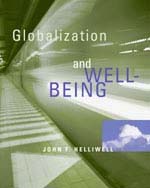
RETHINKING DEVELOPMENT
Local Pathways to Global Wellbeing
St. Francis Xavier University, Antigonish, Nova Scotia, Canada
June 20 to June 24, 2005
Globalization & Wellbeing
Presenters:
John Helliwell, University of British Columbia, Canada
Mark Mancall, Stanford University, USA
Mike Salvaris, Victoria University, Australia (chair)
Rapporteur: Johannes Hirata

Surprising data show that intraregional trade is much [many] times bigger than interregional trade.
these "border-effects" are much bigger for small than for big countries
consequence: gains from trade are already exhausted by intraregional trade and none are left for interregional trade
higher social capital regions have higher economic growth, but this is not necessarily what matters; yet, subjective wellbeing (SWB) was also higher where social capital is high; you cannot substitute trust by law enforcement;
small countries don't need to be as rich as the big OECD countries, rather, they should be as happy as the happiest countries; in fact, research shows that the happiest countries are the rich European countries;
more trade will not generate more growth that people neither need nor want;
people are happy when they face reasonable challenges, not when their life goes effortlessly;
people systematically overestimate the happiness they will get from particular acquisitions;
people put negative value on the income of their neighbors — "keeping up with the Joneses"; income increase of one person has negative effect on the happiness of others; by contrast, increasing social capital has positive effects on others;
See also: Globalization & Wellbeing (642K PDF)
Based on the book Globalization and Well-Being by John F. Helliwell
we are here all concerned with local activities, but nobody talks about politics; as long as you stay below the power radar, you are OK, but once you get caught by the power radar, you are in trouble;
globalization creates local benefits in the short term, but not in the long term (e.g., jobs that had been created in Mexico or Korea are moving to China); we need to pay attention to today's young who will be the decision makers tomorrow;
universities structure the world for their students, through the contents but also through the division of knowledge into disciplines; it is vital to teach students that what they are being taught might not be the truth;
when the King of Bhutan started talking about GNH there was an implicit challenge to reconceptualize economics itself; we must pick up this challenge; Lyonpo Jigme Y. Thinley's speech this morning went a long way reconceptualizing economics;
PowerPoint (1.5MB)
research interest: how can communities develop their own conceptions of wellbeing and implement and measure it; involving citizens in a participatory process;
- we must develop a comprehensive conception of human development
- importance of describing a just and sustainable society in a concrete way;
- the tail must not wag the dog: indicators must not replace political deliberation;
- not everything that counts can be counted and not everything that can be counted counts;
- the measures that matter must be selected in a democratic process; trust in politicians is low;
citizens are not only customers for government services, nor voters who cast their vote once in 4 or 5 years, but they play many other roles as well; statisticians tend to be conservative, relying on familiar measures; quality of life is not well reflected by GDP, it is a matter of the perceived quality of living conditions;
for democracy to be healthy, it needs to be dynamic;
when people are asked about their priorities, they give surprising answers, with material and financial values far behind ideal values (trust, honesty ...);
what matters is that people authentically value the life they lead, not whether some indicators are in the green zone;
- variability of conceptions
- subjectivity,
- lack of correlation of SWB data with suicide rates
Overview :: Presenters :: Proceedings :: Papers :: Home
Sealevel